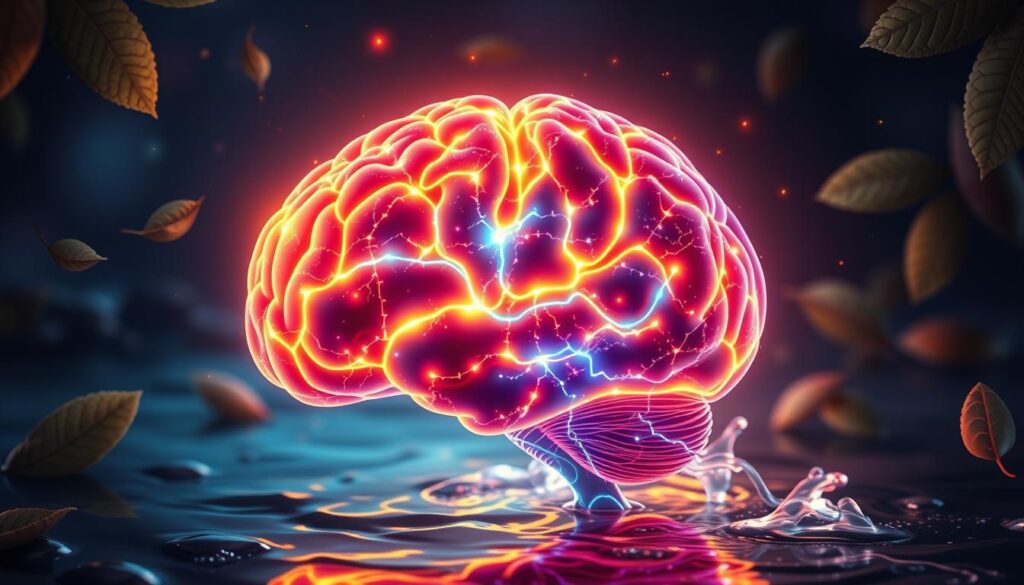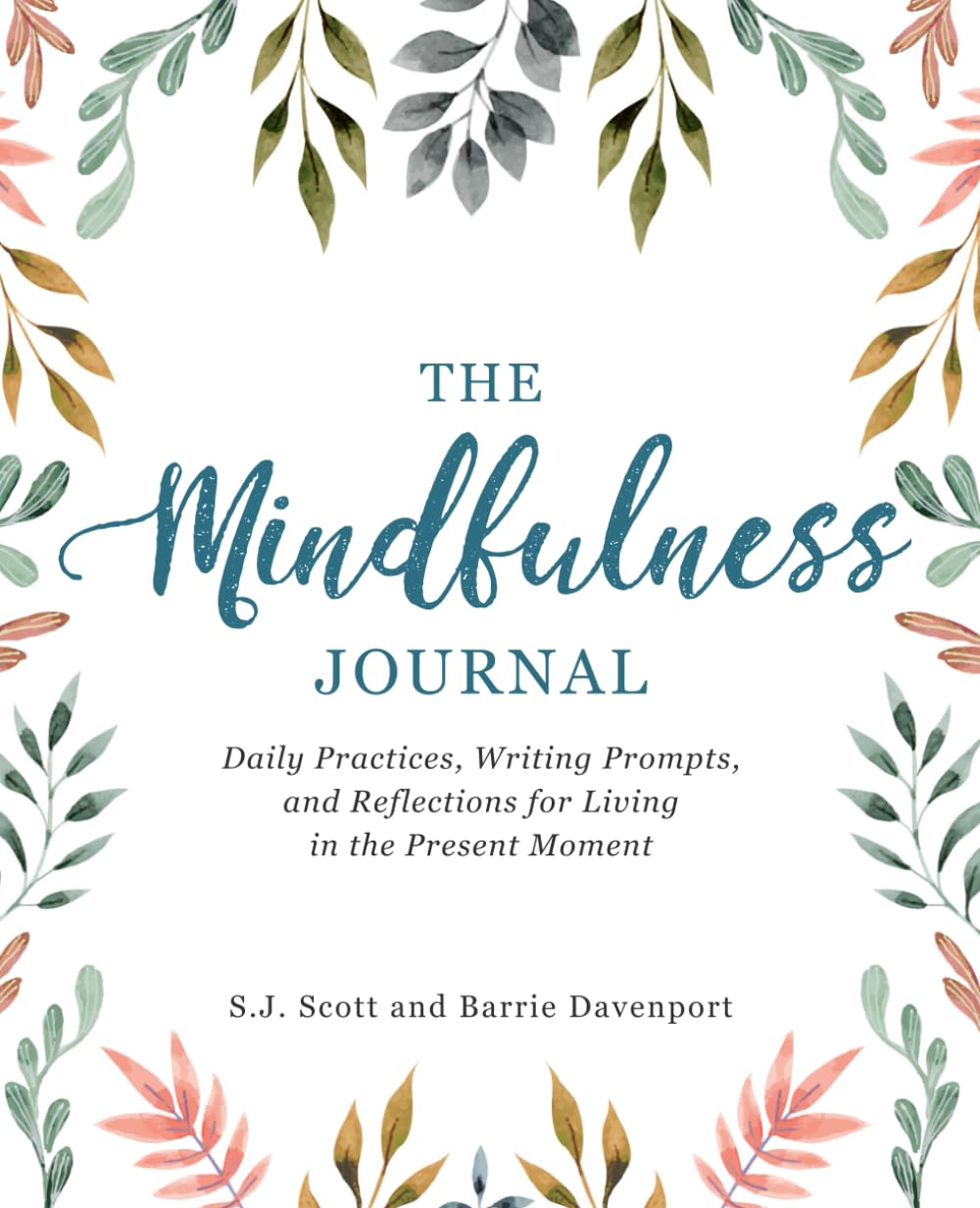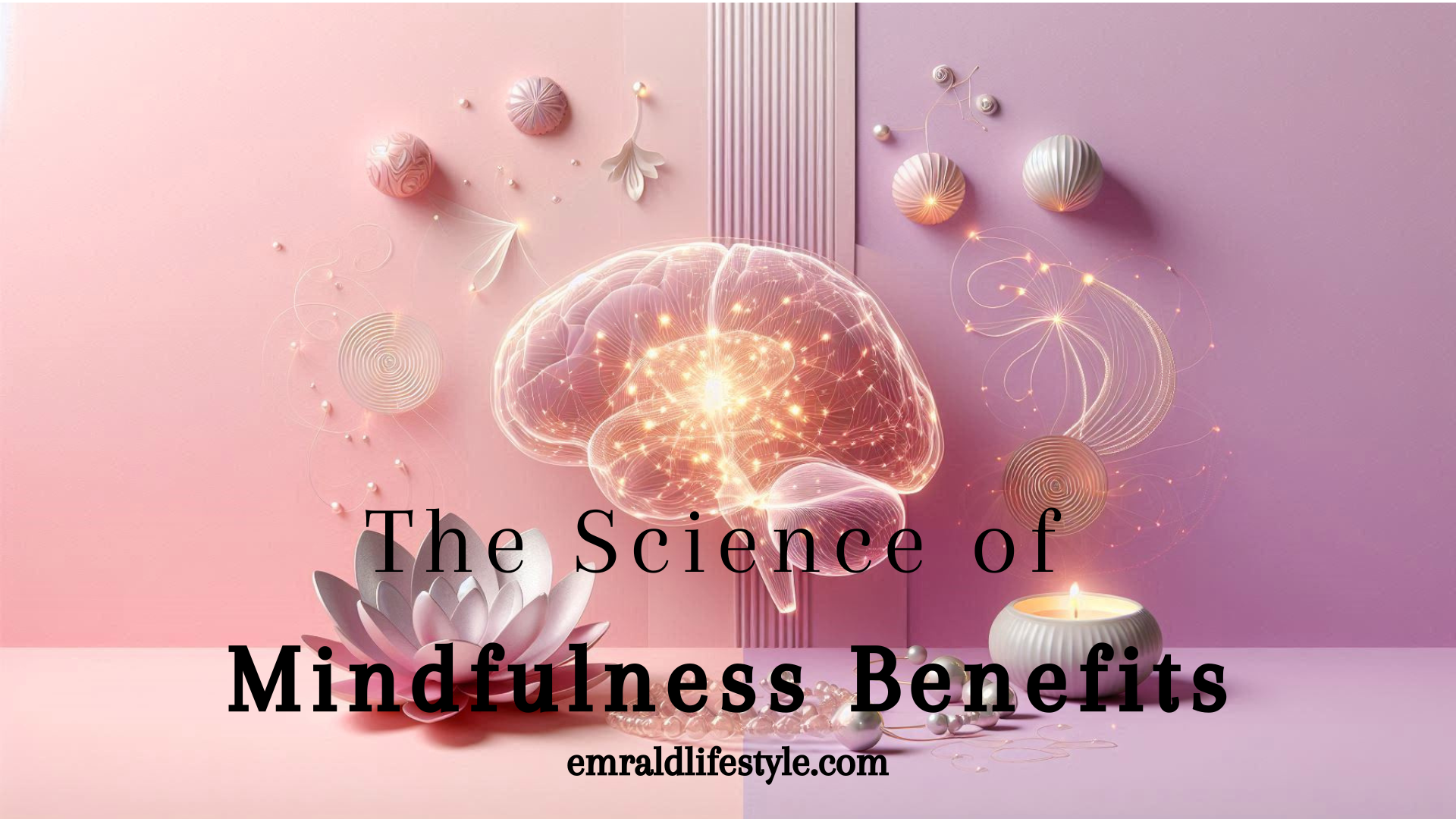Mindfulness is about being fully present and aware in the moment. It has become very popular lately. But, what’s really interesting is how it changes the brain. We’ll explore the Mindfulness brain benefits, how mindfulness can improve your brain’s function, emotional control, and health.

Key Takeaways of The Mindfulness Brain Benefits
- Mindfulness practices can lead to measurable changes in brain structure and function, a phenomenon known as neuroplasticity.
- Regular mindfulness meditation can improve cognitive performance, enhance emotional regulation, and reduce stress response.
- Mindfulness has been shown to increase gray matter density in brain regions associated with learning, memory, and emotional processing.
- Mindfulness-based interventions have been effective in managing various mental health conditions, including depression, anxiety, and PTSD.
- Incorporating mindfulness into your daily life can have far-reaching benefits for your overall brain health and well-being.

Understanding the Science of Mindfulness: A Neurological Perspective
Mindfulness, or being fully present in the moment, has become very popular. It’s known to improve both our mental and physical health. But, what happens in our brains when we practice mindfulness? Let’s explore the science behind it.
Key Brain Regions Involved in Mindfulness
Mindfulness activates important brain areas. The prefrontal cortex handles complex thinking. The hippocampus is key for memory and emotions. The amygdala, our “fear center,” shows less activity, meaning we feel less fear.
The Role of Neurotransmitters in Mindful States
Mindfulness affects our brain’s chemicals, like serotonin and dopamine. These chemicals help control our mood and brain function. Their change during mindfulness might explain why it’s so beneficial.
Neural Pathways and Mindfulness Practice
Mindfulness changes our brain’s connections. Regular practice strengthens areas for attention and emotional control. This can help us deal with stress and stay mentally balanced.
Learning about mindfulness’s effects on our brain helps us see its value. It shows how mindfulness can improve our thinking, feelings, and body health. By understanding the brain’s role, we appreciate mindfulness’s deep impact.
Recommended Tools: Headband Meditation Tracker and Monitor, it provide a Neural Pathways and Mindfulness Practice
Purpose: Meditation feedback device that monitors brain activity
Unique Value: Scientific validation of meditation practice

How Mindfulness Rewires Your Brain Structure
Mindfulness deeply changes your brain’s structure and function. It uses neuroplasticity to make your brain work better. This leads to improved thinking, feeling, and overall health.
Mindfulness increases gray matter in your brain. Gray matter handles information processing. Studies show that regular mindfulness boosts gray matter in areas for focus, emotions, and self-awareness.
Mindfulness also strengthens synaptic connections in your brain. These connections help with learning, memory, and thinking. Mindfulness makes these connections better, making your brain more efficient and flexible.
- Increased gray matter density in regions associated with attention, emotion, and self-awareness
- Enhanced synaptic connections that facilitate learning, memory, and cognitive flexibility
- Improved neuroplasticity, allowing your brain to adapt and change in response to mindfulness practice
The changes in your brain from mindfulness are amazing. They show how flexible your brain is. By doing mindfulness regularly, you can unlock your brain’s full potential. This brings big benefits to your daily life.
The Impact of Mindfulness on Stress Response and Cortisol Levels
Mindfulness helps us stay present and focused. It deeply affects how our body handles stress. By understanding how mindfulness works with the HPA axis, we see its power in managing stress and keeping hormones balanced.
Understanding the Stress Response System
When we feel threatened, the HPA axis kicks in. It releases stress hormones like cortisol. This gets our body ready to face danger. But, today’s stress can keep cortisol levels high for too long. This is bad for our health.
Mindfulness-Based Stress Reduction Techniques
- Focused breathing exercises: Deep, conscious breathing activates the calm part of our nervous system.
- Body scan meditation: This helps us notice and deal with stress in our body.
- Mindful movement: Gentle yoga or tai chi eases muscle tension and brings balance.
Hormonal Balance and Regular Practice
Studies show that mindfulness lowers cortisol levels and reduces stress. It works with the HPA axis to balance hormones and improve stress response. Adding mindfulness to our daily routine can greatly improve our health.
“Mindfulness is not about changing yourself, but about accepting and caring for yourself as you are.”

Memory Enhancement and Cognitive Function Through Mindfulness
Studies show that mindfulness boosts cognitive skills like working memory, attention span, cognitive flexibility, and executive function. It helps the brain process info better, remember things, and make decisions. Mindfulness makes us more aware and non-judgmental in the moment.
Mindfulness improves working memory by increasing gray matter in key brain areas. This means better info storage and processing. Regular practice enhances these abilities.
It also boosts attention span and cognitive flexibility. Mindfulness helps focus and reduce distractions. This makes it easier to switch tasks and solve problems.
Recommended Product: The Mindful Brain Journal
Purpose: Structured journal for tracking mindfulness practice and brain benefits
Unique Value: Science-based journaling prompts

Furthermore, mindfulness strengthens executive function. It includes skills like planning and self-control. A calm mind leads to better emotion management and goal achievement.
| Cognitive Benefit | Description | Research Findings |
|---|---|---|
| Working Memory | The cognitive system responsible for temporarily storing and manipulating information | Increased gray matter density in brain regions associated with working memory |
| Attention Span | The ability to focus and sustain attention on a task or information | Enhanced ability to reduce distractions and maintain focus |
| Cognitive Flexibility | The capacity to switch between tasks and adapt to changing situations | Improved problem-solving and decision-making skills |
| Executive Function | Higher-order cognitive abilities such as planning, goal-setting, and self-regulation | Enhanced emotional regulation and self-management capabilities |
Adding mindfulness to your day can unlock your brain’s full potential. It leads to better memory, focus, adaptability, and decision-making. Mindfulness can transform your mental performance and well-being.

“Mindfulness is a way of being, not just a technique. It’s about waking up, being fully alive, and being present for the richness of each moment of our lives.” – Jon Kabat-Zinn
Emotional Regulation and Brain Plasticity
Mindfulness greatly affects our emotional intelligence and mood. It helps us stay balanced and resilient. By understanding how it works, we can use mindfulness to improve our emotional health.
The Amygdala Response
The amygdala is a small part of the brain that handles emotions. Mindfulness helps control the amygdala, making us less reactive to stress. This leads to better mood and emotional smarts.
Building Emotional Resilience
Mindfulness helps us handle emotions better and become more resilient. It trains us to stay present and calm, even when things get tough. This resilience is key for our mental health and growth.
Long-term Effects on Mood Regulation with Mindfulness brain benefits
Regular mindfulness changes our brain, especially in areas for emotion and mood. These changes help us feel more emotionally balanced over time. We become smarter about our emotions.
“Mindfulness is not just about being in the present moment; it’s about being present with ourselves, with all of our emotions, both positive and negative, and learning to respond to them with compassion and wisdom. In fact, numerous studies have shown the mindfulness brain benefits of practicing mindfulness regularly.”

| Dimension | Impact of Mindfulness |
|---|---|
| Emotional Intelligence | Improved ability to recognize, understand, and manage emotions |
| Mood Stability | Reduced emotional reactivity and more balanced emotional states |
| Amygdala Regulation | Decreased activity in the amygdala, leading to better emotional control |
| Resilience | Enhanced capacity to navigate challenges and maintain mental well-being |
Mindfulness Meditation and Gray Matter Density
Recent studies have shown Mindfulness brain benefits. It can make gray matter denser in different brain areas.
Gray matter is where nerve cells and synapses are. These are key for processing information and thinking. People who meditate often have increased cortical thickness in areas linked to attention, emotions, and self-awareness.
This growth in brain volume and neurogenesis is seen in both new and experienced meditators. It shows the brain’s neuroplasticity can be tapped into with regular mindfulness practice.
These changes in the brain could also slow down brain aging and improve thinking. More gray matter is linked to better memory, focus, and emotional strength. These are all good for brain health as we age.
“The regular practice of meditation appears to have a positive impact on brain structure, suggesting that the human brain has the capacity to adapt and change, even in adulthood.”
Adding mindfulness to your daily life could change your brain for the better. It can boost your thinking skills and make your mind more vibrant and strong. The science behind this connection is amazing and opens up new ways to keep our brains healthy as we get older.
The Connection Between Mindfulness and Mental Health
Mindfulness is about being fully present and aware. It’s a powerful tool for mental health. It helps people deal with depression, anxiety, and PTSD.
Depression and Anxiety Management
Studies show mindfulness works well for depression and anxiety. It helps people see things more clearly and feel their emotions better. By focusing on now, not past or future, symptoms lessen.
PTSD and Trauma Recovery
Mindfulness helps those who’ve been through trauma. It lets them face their feelings without judgment. This can make PTSD symptoms like flashbacks and numbness better.
Building Mental Resilience
Mindfulness, with its myriad mindfulness brain benefits, does more than just help with specific issues. It builds mental strength, teaches us to handle stress better, and makes us more resilient and happy in life.
Mindfulness in mental health treatment is a game-changer. It lets people find peace and build a stronger life. It’s about using the present to heal and grow.
| Mindfulness and Mental Health Benefits | Description |
|---|---|
| Depression and Anxiety Management | Mindfulness practices can help reduce negative thought patterns, improve emotional regulation, and alleviate symptoms of depression and anxiety. |
| PTSD and Trauma Recovery | Mindfulness can aid in the processing and integration of traumatic experiences, leading to a reduction in PTSD symptoms and enhanced psychological resilience. |
| Building Mental Resilience | Mindfulness training can cultivate a greater capacity to cope with life’s challenges, leading to improved overall mental well-being and life satisfaction. |
“Mindfulness is not just a technique; it’s a way of being, a way of engaging with the world.”
Recommended Product: Mindfulness Cards – Daily Practice Deck
Purpose: Science-based mindfulness exercise cards
Unique Value: Quick, accessible mindfulness exercises

Practical Applications of Mindfulness in Daily Life
Mindfulness isn’t just for meditation or yoga. Mindfulness brain benefits, It can be part of your daily routine. It helps in mindful eating, workplace mindfulness, and more. See how you can add mindfulness to your daily life.
Recommended Product: Buddha Board Mindfulness Drawing Set, it’s a Zen drawing board for mindful art practice
Unique Value: Combines creativity with mindfulness

Mindful Eating: Savor Every Bite
Mindful eating means being fully present while eating. It improves your food relationship, digestion, and weight management. Slow down, notice the smells, tastes, and textures of your food. Avoid distractions during meals.
Mindful Communication: Deepen Connections
Mindful communication changes how you talk to others. It leads to deeper conversations, better conflict resolution, and stronger bonds. Before you speak, pause, make eye contact, and listen fully.
Mindful Parenting: Nurture with Presence
Mindful parenting means focusing on the joys and challenges of raising kids. It helps you respond with patience, empathy, and wisdom. This strengthens your bond and supports your kids’ emotional growth.
Workplace Mindfulness: Enhance Productivity and Well-being
Workplace mindfulness boosts focus, reduces stress, and increases job happiness. Take mindfulness breaks, communicate mindfully with coworkers, and create a compassionate work environment.
| Mindfulness Practice | Benefits |
|---|---|
| Mindful Eating | Improved digestion, healthy weight management, enhanced relationship with food |
| Mindful Communication | Deeper connections, more effective conflict resolution, strengthened relationships |
| Mindful Parenting | Increased patience, empathy, and wisdom in parenting, stronger parent-child bond |
| Workplace Mindfulness | Improved focus, reduced stress, increased job satisfaction |
Adding mindfulness to your daily life can greatly improve your well-being. It brings awareness to your life, leading to more fulfillment, joy, and resilience.
Conclusion
Studies show that mindfulness greatly improves brain health and mental well-being. It boosts neural connections and emotional strength. This practice can change your brain and life for the better.
Regular mindfulness can change your brain, making you more focused and calm. It helps manage stress and anxiety. By making mindfulness a part of your day, you can unlock your mind’s full potential.
Start your mindfulness journey and discover a healthier, smarter you. Begin with small steps and be patient. See how your mind and body change. Begin this journey and unlock the power of the present moment.
FAQ
What is the scientific basis for the benefits of mindfulness?
Mindfulness brain benefits include changes that improve mental health and cognitive function. Studies show it can make the brain more flexible and adaptable. It also increases gray matter and balances neurotransmitters.
How does mindfulness practice affect key brain regions?
Mindfulness changes how different parts of the brain work. This includes areas for attention, emotions, and memory. These changes help improve how we think and feel.
What is the role of neurotransmitters in mindful states?
Neurotransmitters like serotonin and dopamine are key in mindfulness. They help control mood and focus. This balance is why mindfulness can calm and focus the mind.
How does mindfulness rewire the brain’s structure?
Regular mindfulness practice changes the brain’s structure. This is called neuroplasticity. It can make brain areas more efficient and even grow new neurons.
What is the impact of mindfulness on stress response and cortisol levels?
Mindfulness helps control stress and cortisol levels. It can reduce stress hormones and improve emotional and physical health. This leads to better well-being.
How does mindfulness improve memory and cognitive function?
Mindfulness boosts memory, attention, and executive function. It helps focus and switch tasks. This improves overall brain performance.
How does mindfulness affect emotional regulation and brain plasticity?
Mindfulness changes how we handle emotions. It helps the amygdala process emotions better. This leads to better emotional control and intelligence over time.
What are the effects of mindfulness meditation on gray matter density?
Studies show mindfulness meditation increases gray matter in key brain areas. This includes the prefrontal cortex and hippocampus. These changes are linked to better brain health and function.
How can mindfulness be used to manage mental health conditions?
Mindfulness helps treat mental health issues like depression and anxiety. It changes how the brain responds to stress. This makes it a valuable tool for recovery.
What are some practical ways to incorporate mindfulness into daily life?
Mindfulness can be part of daily activities like eating and work. It helps stay present and focused. This improves emotional balance in everyday life




